The Dr. Ram Manohar Lohia Institute of Medical Sciences (DR RMLIMS) had released the RML Nursing Officer vacancy, inviting eligible candidates to apply for this prestigious position. The recruitment process involves multiple stages, including a Screening Examination and a Main Examination, both conducted through a Computer-Based Test (CBT). Candidates must carefully go through each stage’s requirements and plan their preparation accordingly to secure a place as a Nursing Officer at DR RMLIMS.
RML Nursing Officer Syllabus 2026
The exam syllabus of the RML Nursing Officer Recruitment is designed to assess candidates’ professional knowledge in Nursing along with general aptitude, reasoning, and language skills. Both the Screening Examination and Main Examination follow the same syllabus, so candidates do not need to prepare differently for the two stages. The syllabus covers five main sections: Nursing Subjects, General Knowledge, Reasoning, Quantitative Aptitude, and General English, ensuring candidates are tested comprehensively on both technical and general aspects required for the role.
The Nursing Subjects section focuses on professional skills and medical knowledge, while the General Knowledge and Aptitude sections assess candidates’ awareness, logical reasoning, and problem-solving abilities. General English evaluates grammar, comprehension, and vocabulary. Candidates should also be aware of negative marking for incorrect answers and the total marks distribution, as it will guide their preparation strategy and time allocation for each section.
RMLIMS Nursing Officer Exam Pattern 2026
Before diving into the detailed syllabus, aspirants must familiarise themselves with the RML Nursing Officer Exam Pattern 2026. Understanding the exam pattern is crucial as it provides clarity about the number of questions, mark distribution, duration, and the type of questions. Both Screening and Main Examinations are CBT-based, multiple-choice tests conducted bilingually in English and Hindi, with a total of 100 marks.
| RML Nursing Officer Exam Pattern 2026 | |
| Particulars | Details |
| Exam Mode |
Computer-Based Test (CBT)
|
| Type of Questions |
Multiple Choice Questions (MCQs)
|
| Total Marks | 100 |
| Duration | 2 Hours |
| Language |
English & Hindi (Bilingual)
|
| Stages |
Screening Examination & Main Examination
|
| Negative Marking |
Yes (-0.25 marks per wrong answer)
|
| Section-Wise Distribution of Questions & Marks |
|
| Marking Scheme |
|
RML Nursing Officer Detailed Syllabus 2026
Although an official syllabus PDF has yet to be released, this syllabus aligns with the actual exam pattern and previous exam sessions. This RML Nursing Officer Syllabus provides a comprehensive overview of topics candidates must prepare for to succeed in both the Screening and Main Examinations. The syllabus ensures evaluation of candidates’ technical nursing knowledge, analytical skills, numerical ability, and English language proficiency. Proper focus on each section will enhance overall performance and improve chances of selection.
Part A: Nursing Subjects
This section carries 60 marks and evaluates a candidate’s professional nursing knowledge. It is the most crucial section and requires thorough preparation across all sub-topics, including basic nursing, medical-surgical concepts, anatomy, pharmacology, and allied sciences. Candidates should focus on practical and theoretical understanding to answer questions effectively.
| Subject Area | Key Topics |
| Basic Nursing & Fundamentals |
Fundamentals of Nursing, Personal Hygiene, First Aid, Environmental Hygiene, Nutrition, Computers in Nursing, Health Education & Community Pharmacy
|
| Medical & Clinical Nursing |
Medical-Surgical Nursing, Community Health Nursing, Psychiatric Nursing, Midwifery & Gynaecological Nursing, Clinical Pathology, Hospital & Clinical Pharmacy
|
| Anatomy, Physiology & Allied Sciences |
Human Anatomy & Physiology, Biochemistry, Microbiology, Toxicology
|
| Pharmacological & Chemical Sciences |
Pharmacology, Pharmacognosy, Pharmaceutics, Pharmaceutical Chemistry, Drug Store Management, Pharmaceutical Jurisprudence
|
| Behavioral & Social Sciences |
Psychology, Sociology
|
| Administration & Accountancy |
Accountancy, Health Education and Management
|
Part B: General Knowledge
The General Knowledge section evaluates awareness of current events, national and international affairs, polity, economy, history, geography, science, and culture. Candidates should stay updated with recent developments while also revising basic GK concepts. This section contributes 10 marks to the total exam score.
| Subject Area | Key Topics |
| General Awareness |
Current affairs, government schemes, famous personalities, awards
|
| Indian Polity & Economy |
Indian Constitution, governance, economic developments
|
| History & Geography |
Indian history, geography, states & capitals
|
| Science & Technology |
Recent scientific research, environmental issues
|
| Miscellaneous |
Sports, culture, art, important events
|
Part C: Reasoning Ability
This section measures logical thinking and analytical reasoning skills. Questions may involve patterns, sequences, or problem-solving scenarios. Candidates must practice questions related to reasoning regularly to improve accuracy and speed. This section carries 10 marks.
| Subject Area | Key Topics |
| Analytical Reasoning |
Analogies, Coding-Decoding, Alphabetical & Number Series, Classification
|
| Logical Thinking |
Syllogism, Blood Relations, Statement–Arguments, Assumptions, Conclusions
|
| Data & Decision Making |
Venn Diagrams, Data Interpretation, Direction Tests, Decision Making
|
Part D: Quantitative Aptitude
This section tests numerical and mathematical problem-solving ability. Candidates should focus on arithmetic operations, applied mathematics, and quantitative analysis questions to secure full marks. The section contributes 10 marks.
| Subject Area | Key Topics |
| Arithmetic Operations |
Percentages, Ratios, Averages, Profit & Loss, Discounts
|
| Applied Mathematics |
Time, Speed & Distance, Time & Work, Pipes & Cisterns, Boats & Streams, Problems on Ages
|
| Quantitative Analysis |
HCF & LCM, Simple & Compound Interest, Surds & Indices, Areas, Volumes, Surface Area
|
| Advanced Problems |
Allegation & Mixture, Partnership, Square & Cube Roots
|
Part E: General English
The General English section evaluates grammar, vocabulary, comprehension, and usage skills. Proper command over these topics ensures candidates can attempt questions accurately and efficiently. This section carries 10 marks.
| Subject Area | Key Topics |
| Grammar & Structure |
Articles, Verbs, Adjectives, Adverbs, Subject-Verb Agreement, Tenses
|
| Vocabulary |
Synonyms, Antonyms, Word Formation, One Word Substitution
|
| Comprehension Skills |
Reading Comprehension, Cloze Test, Fill in the Blanks, Sentence Rearrangement
|
| Error Detection & Correction |
Spot the Error, Sentence Correction, Phrase Replacement
|
| Idioms & Usage |
Idioms & Phrases, Para Jumbles, Contextual Meaning
|
RML Nursing Officer Selection Process 2026
Though the syllabus provides a complete guide, candidates must also understand the selection process to plan their preparation effectively. The selection is based on a Screening Examination followed by a Main Examination, with final merit determined from Main Exam scores. Candidates must ensure eligibility criteria before applying.
- Screening Examination: Qualifying in nature; only shortlisted candidates (10 times vacancies per category) proceed to the Main Exam.
- Main Examination: Marks obtained will be considered for final selection; category-wise merit prepared as per reservation norms.
- Document Verification: Eligibility, qualifications, and experience are checked before issuing appointment letters.
| Related Posts | |
| RML Nursing Officer Eligibility | RML Nursing Officer Salary |
| RML Nursing Officer Mock Test | |

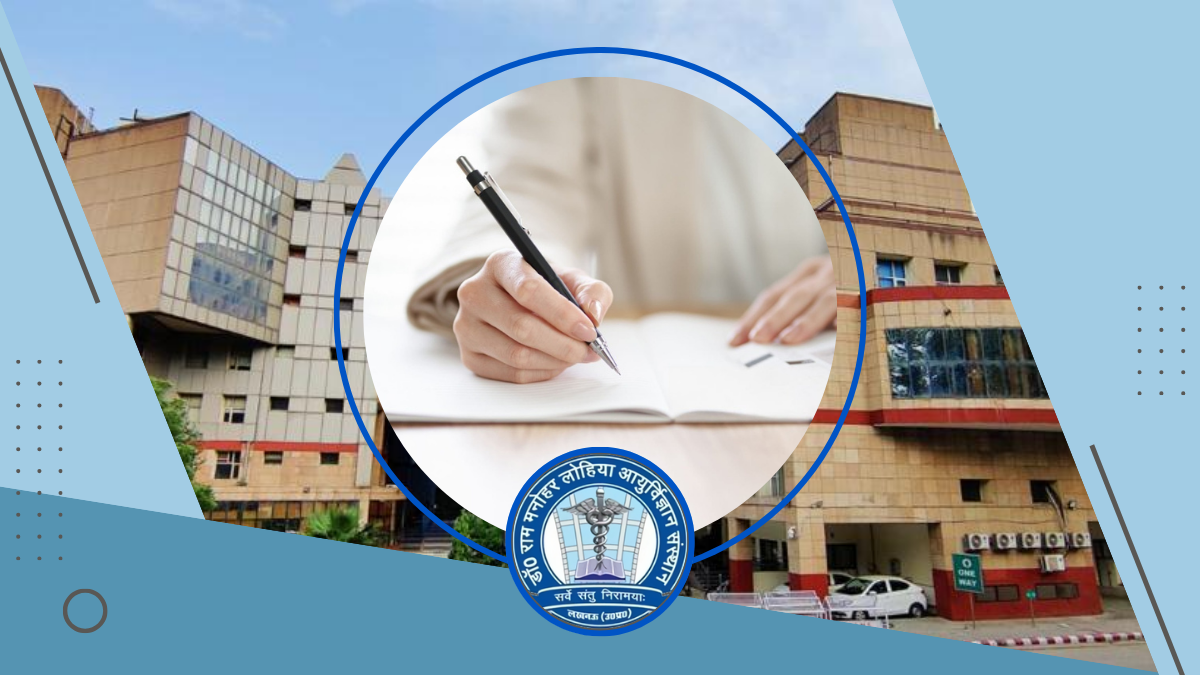
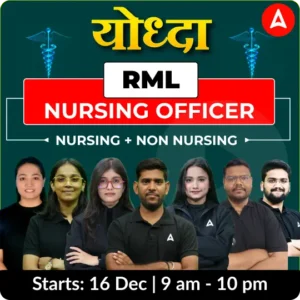

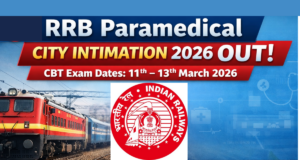 RRB Paramedical City Intimation 2026 Out...
RRB Paramedical City Intimation 2026 Out...
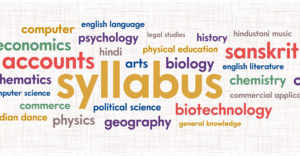 OSSC CHSL Syllabus 2026, Check Prelims A...
OSSC CHSL Syllabus 2026, Check Prelims A...
 Madras High Court Office Assistant Sylla...
Madras High Court Office Assistant Sylla...
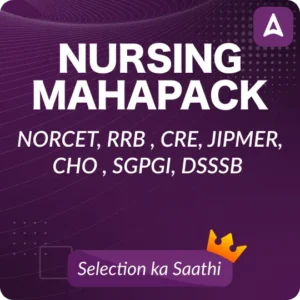
 Adda247 Job portal has complete information about all Sarkari Jobs and Naukri Alerts, its latest recruitment notifications, from all state and national level jobs and their updates.
Adda247 Job portal has complete information about all Sarkari Jobs and Naukri Alerts, its latest recruitment notifications, from all state and national level jobs and their updates.




